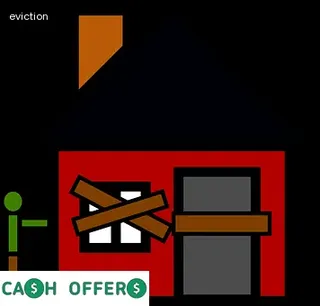Eviction is a legal process, and as such, it has to be done within the confines of the law. In Indiana, eviction proceedings must follow all relevant landlord-tenant laws and regulations.
The grounds for eviction in Indiana are outlined by the state’s landlord-tenant law. They include failure to pay rent on time, violation of a lease agreement, or illegal activity on the property.
Tenants also have rights they must be aware of during an eviction process. For example, they must receive written notice to vacate prior to any action being taken against them and cannot be evicted without due cause.
Landlords are also required to adhere to certain obligations when initiating an eviction proceeding in Indiana such as providing the tenant with enough time to move out before filing for a court order or using force or threats against them. Understanding these laws is essential for both landlords and tenants so that they can protect their rights during the eviction process.

In Indiana, the legal eviction process can often be lengthy and complicated. It is important for landlords to understand their rights and obligations when it comes to evicting a tenant in order to ensure that all procedures are followed correctly.
The first step in the legal eviction process is to deliver a written notice of termination, specifying the reasons for eviction and the date by which the tenant must vacate the property. After this notice has been served, if the tenant continues to stay on the property beyond this date, then a landlord may file an Eviction Complaint with the Court.
At this point, an Order of Possession will be issued by the court, granting permission for law enforcement to remove the tenant from the property. It's important for landlords to note that during this process they must follow all relevant regulations regarding landlords and tenants' rights in Indiana or risk facing penalties or other legal action.
Exploring Indiana's eviction process timeline can be a complex endeavor. The length of the eviction process in Indiana depends on numerous factors, such as the type of eviction case and whether the tenant contests the eviction.
In general, however, the typical eviction timeline starts with a notice from the landlord and ends with a court hearing. After receiving notice from their landlord, tenants have a certain period of time to vacate or contest the eviction.
If they decide to contest it, they must appear at an initial hearing before a judge. At this hearing, both parties present their cases and the judge may issue a temporary order allowing or denying possession of the property.
Depending on their decision and other factors, such as whether either party appeals it, tenants may ultimately have to vacate within a few weeks or months after receiving an initial notice from their landlord. Landlords should also be aware that there are specific regulations governing tenant rights that must be adhered to when completing an eviction in Indiana to ensure that all deadlines are met according to state law.

The cost of an eviction in Indiana can vary significantly depending on the complexity of the case. Generally, landlords must pay court fees, attorney fees and other associated costs such as property inspection and maintenance fees.
Additionally, if a tenant has withheld rent payments or caused damage to the property, the landlord may also be liable for these costs. In some cases, legal fees can be quite expensive if a court hearing is necessary to settle a dispute between the landlord and tenant.
Eviction proceedings can take anywhere from a few days to several months depending on whether it goes to court. Understanding Indiana’s landlord-tenant laws is key to avoiding costly delays and ensuring that both parties are abiding by their rights and responsibilities.
Evictions in Indiana can be complex and difficult to understand without researching the relevant laws and regulations. Many tenants have questions about what rights they have and how long the eviction process takes, so this article provides an overview of the most frequently asked questions regarding evictions in Indiana.
Landlords must provide proper notice before filing for eviction, as tenants must be informed of their rights throughout the entire process. Furthermore, landlords are obligated to follow specific steps when evicting a tenant, such as filing with the court and serving papers.
Additionally, each county has its own set of rules governing evictions that need to be followed by both landlords and tenants. Indiana also offers certain protections for tenants who qualify for them, such as those living in subsidized housing or Section 8 apartments.
It is important to note that even with these protections in place, it is still possible for a tenant to be evicted if they fail to pay rent or otherwise breach their lease agreement. Finally, it is important to understand that the eviction process can take anywhere from a few weeks up to several months depending on a variety of factors such as court backlogs or appeals filed by either party.

Comparing eviction rules across states can be a complex process, and Indiana is no exception. Landlord-tenant laws vary from state to state, and the length of the eviction process in Indiana depends on how quickly an order from the court is issued.
Tenants have certain rights that must be respected by landlords throughout this process. Generally, it is required that landlords provide written notice of eviction before filing a complaint with the court.
The tenant then has seven days to respond to the complaint or vacate the premises if they do not wish to contest the order. If the tenant decides to contest, a hearing is scheduled during which both parties must present their case.
After this hearing, a ruling will be given and if it favors the landlord, they may then file a writ of possession with the court which authorizes law enforcement to remove any tenants still occupying the property after being served with an eviction notice. The whole process may take anywhere from two weeks to two months depending on how quickly all necessary steps are completed.
Evictions in Indiana are the process of a landlord legally removing a tenant from their property. The legal process is governed by the Indiana Code Title 32, Article 31 which outlines state law regarding eviction proceedings and outlines the rights of both tenants and landlords.
When evicting a tenant, an Indiana landlord must provide written notice to the tenant that specifies why they are being evicted and give them sufficient time to either remedy the issue or move out; this period is typically 30 days but can vary depending on what the lease states. If the tenant does not comply with the notice, then a landlord has to file a complaint with their local court where an eviction hearing will be held.
After this hearing, if it is determined that the tenant should be evicted, then a writ of possession will be issued which allows for law enforcement officers to physically remove any remaining occupants in order for the landlord to retake possession of their property. Additionally, there may also be financial penalties imposed on tenants who have been evicted such as court fees and damages due to violations of rental agreements.
It is important for both landlords and tenants in Indiana to understand their rights and obligations under state law so that they can avoid potential issues related to eviction proceedings.

In Indiana, the eviction process can take some time depending on the cause. Landlords and tenants both have rights and responsibilities under state law, and understanding those is important when it comes to evictions.
Generally speaking, a tenant may be evicted if they fail to pay rent, breach a lease agreement in any way, damage the property beyond normal wear-and-tear, or engage in illegal activity on the premises. Additionally, landlords may evict tenants for other reasons such as refusing to accept a rent increase or subletting without permission.
It is important for tenants to know their rights so that they can understand why they are being evicted and what steps they need to take in order to avoid an eviction. Knowing these causes can help inform renters of their potential risks when renting a property.
In Indiana, there are certain situations where an eviction is not allowed under state laws. Landlords must understand their tenant's rights and regulations in order to ensure they are following all legal requirements.
If a landlord attempts to evict a tenant without cause or in violation of a lease agreement, then the eviction process will be halted. In addition, Indiana law prohibits landlords from evicting tenants who have filed an official complaint against them with the state or local housing authority.
Landlords may also not evict tenants due to religion, race, color, national origin, sex, familial status or disability. Lastly, a landlord cannot evict a tenant if they have made repairs requested by the tenant that were outside of the scope of the original lease agreement.
It is important for landlords and tenants alike to understand these restrictions in order to maintain their rights and obligations within Indiana law.

The eviction process in Indiana varies depending on the circumstances of each case, but typically includes multiple steps. Generally speaking, the landlord must first serve a written notice to the tenant that outlines the specific violation and specifies an amount of time for them to make necessary changes or vacate the property.
If the tenant does not comply with this notice within the allotted timeframe, then the landlord may proceed with filing an eviction lawsuit in court. The court will then issue a summons, which requires the tenant to appear in court and defend their case.
After both parties present their evidence, the judge will issue a ruling either granting summary judgment in favor of the landlord or setting another date for trial. If summary judgement is granted in favor of the landlord, then a writ of execution will be issued which allows for removal of tenants by law enforcement officers if necessary.
Tenants are also entitled to appeal any decision made by the court during this process. During all steps of this process it is important to be aware of Indiana’s landlord-tenant laws and regulations as they can help protect both parties involved in an eviction situation.
In Indiana, an eviction process can be a lengthy and complicated legal matter. However, in some situations, landlords have the option to pursue an Emergency Possessory Order (EPO) as an alternative to a traditional court ordered eviction.
An EPO gives the landlord immediate access to their rental property, bypassing certain legal procedures that may take weeks or months when going through the courts. This does not mean that tenants are without rights - there are still regulations in place for EPOs which must be followed by both parties.
Landlords must provide proper notice of termination before pursuing an EPO and must still file a complaint with the court before it can be granted. Tenants also have rights under Indiana law which must be observed by their landlord during the eviction process.
For example, if the tenant is unable to pay rent due to extenuating circumstances such as a job loss or medical emergency, the landlord is obligated to provide written notice of their intent to terminate before pursuing any other remedies such as an EPO. It is important for both landlords and tenants to understand these rights and regulations so they can ensure that all legal proceedings are handled properly and quickly in order to minimize disruption and delays in eviction proceedings.

The eviction process in Indiana can be a long and difficult experience for both tenants and landlords, but other damages that may accompany an unlawful eviction can add additional complications. It is important for both parties to understand their rights under the law so they know what to expect.
Depending on the circumstances of the eviction, tenants may be able to pursue financial compensation for additional damages such as lost wages from missed work or reimbursement for relocation costs. Tenants may also be able to seek legal fees or even punitive damages if they suffered emotional distress due to an illegal eviction.
Landlords should not take any action until all fees are paid and proper notice has been given in order to avoid any potential legal issues. Understanding the laws surrounding landlord-tenant relationships is essential in order to protect both parties during an eviction process.
When dealing with an eviction in Indiana, it is important to understand the rules and regulations of landlord and tenant rights. Learning as much as possible about the process can help to ensure that both parties are following all applicable laws.
To find additional resources on the eviction process in Indiana, individuals can look to the state’s Landlord-Tenant Law Guide or contact their local court clerk for more information. Additionally, researching online can provide a wealth of knowledge about tenant and landlord rights, including information about how long an eviction process may take.
It is also beneficial to consult an attorney who specializes in landlord-tenant law as they can provide guidance on any questions regarding legal proceedings and paperwork. Doing thorough research before engaging in an eviction process is essential for understanding what is expected of landowners and tenants, and will help both parties navigate this situation successfully.

In Indiana, a landlord may choose to dissolve a tenancy if the tenant does not uphold the terms of their lease agreement or fails to pay rent. In these cases, the landlord must provide the tenant with written notice that outlines the specific reason for the termination of their tenancy.
This notice is typically referred to as a Notice to Quit and must be sent by certified mail or delivered in person. The Notice to Quit must provide at least 30 days for a fixed term lease and 10 days for a month-to-month agreement before eviction proceedings can begin.
If the tenant chooses not to vacate within this timeframe, then legal action may be taken by filing an eviction lawsuit through small claims court. The timeline of this process can vary depending upon how quickly a hearing can be scheduled and whether or not it is contested by either party.
During this time, landlords are required to adhere to all state laws regarding eviction procedures, including maintaining all relevant paperwork and following proper protocol when serving notices. Ultimately, it is important for both landlords and tenants to understand their rights and responsibilities in order to protect themselves during such proceedings.
The duration of an average Indianapolis, IN eviction process is largely determined by the landlord and tenant rights and regulations enforced in the state. Indiana law requires landlords to provide tenants with written notice before starting an eviction proceeding, which typically must be at least 10 days in length.
To begin the process, a landlord must file a complaint in court. The tenant then has up to 10 days to respond to the complaint.
If the tenant does not respond or fails to appear in court, then a judgment of possession may be granted immediately after the hearing. If the tenant responds or appears in court and contests the eviction, then a trial will be held where both parties can present evidence and make arguments related to their case.
After the trial, a verdict will be issued within five days; if it is ruled in favor of the landlord, then they may seek an order for possession from the court but are not permitted to physically remove tenants until 30 days have passed from when judgment was entered.

Property managers in Indiana have a number of duties to perform when an eviction process is initiated. It is their responsibility to ensure that all legal requirements are met, and they must act in accordance with landlord-tenant laws and regulations.
They must also be aware of the specific procedures that must be followed in order to effect an eviction lawfully. This includes notifying tenants of their rights and obligations under the law, as well as serving notice of eviction on tenants who are in breach of their tenancy agreement.
Additionally, property managers must maintain records for legal proceedings, provide proof of service if necessary, and attend court hearings if required by the court. In addition to these basic duties, property managers may also be required to assist tenants with relocation services or other forms of assistance during the eviction process.
Property managers should be knowledgeable about state laws regarding evictions so that they can best serve their clients’ interests while still remaining compliant with state statutes and regulations.
If you are a tenant in Indiana, the eviction process can be a daunting and confusing experience. Knowing your rights as a tenant, and understanding the entire process of eviction, will help you prepare for what to expect should your landlord decide to evict you.
In Indiana, how quickly can you be evicted? The length of the eviction process may vary depending on several factors such as whether or not the tenant is contesting the eviction or if the landlord is pursuing an expedited eviction through court proceedings. It is important to understand Indiana’s landlord-tenant laws so that tenants can protect their rights throughout this process.
Generally speaking, it could take anywhere between two weeks and two months for an eviction to be completed in Indiana. This timeline includes any notices given by the landlord, any court proceedings needed, and any time for a tenant to vacate after an order of possession has been issued.
Although this may seem like a lengthy amount of time if you are facing an imminent threat of eviction it is important to understand all aspects of Indiana’s laws before proceeding.

Eviction can be a stressful and overwhelming process for both landlords and tenants. In Indiana, the eviction process can take anywhere from a few weeks to several months depending on the specific circumstances of each case.
Generally speaking, it takes about 30 days for an eviction to fall off in Indiana. However, this may vary depending on whether the tenant files a response or not, as well as other factors such as court fees and wait times.
It's important to understand both landlord and tenant rights and regulations when going through this process so that all parties are aware of their rights and responsibilities. This includes knowing what constitutes legal cause for eviction in Indiana, providing adequate notice to tenants before initiating legal proceedings, understanding the relevant laws regarding payment of rent after being served with an eviction notice, filing a response if served with an eviction complaint, attending all scheduled court hearings, and understanding the state’s rules regarding post-eviction collection efforts.
By familiarizing yourself with these laws and regulations pertaining to evictions in Indiana, you will have a better understanding of how long it takes an eviction to fall off your record in the state.
If you have received an eviction notice in Indiana, it is important to understand the eviction process and your rights as a tenant. In Indiana, a landlord must provide written notice that the tenant must vacate the premises by a certain date before an eviction action can begin.
This notice must include information about how long the tenant has before being evicted, and typically gives ten days to vacate the premises. If the tenant does not comply with this notice, then the landlord can file an eviction lawsuit in court.
The court will then set a hearing date where both parties can present evidence and witnesses. After considering all of the evidence presented at this hearing, the court will make a ruling on whether or not to grant an order of possession to the landlord.
If granted, this order allows for sheriff’s deputies to remove any possessions that remain on the property within 48 hours of service of the order. The entire process from receiving an eviction notice to removal usually takes 30-45 days in Indiana, but may take longer depending on how quickly paperwork is filed and hearings are scheduled in court.
If you are facing eviction in Indiana, it is important to understand your rights and the laws that govern landlord-tenant relationships. Knowing how long the eviction process takes can help you plan your next steps, so it’s important to be aware of the timeline.
In Indiana, an eviction action begins when a landlord serves a tenant with a formal notice to vacate. Depending on reasons for the termination, a tenant may have three days or up to 30 days to respond.
After this period ends, if no resolution is reached and the tenant does not voluntarily vacate, then the landlord can file a complaint with the court for an eviction order. The court will then schedule a hearing within approximately 14 days of filing the complaint.
If an eviction order is granted by the court after the hearing, then usually within 24 hours of being served notice of the order, tenants must move out or face possible arrest or forcible removal from their rental unit by local law enforcement authorities. Tenants do not have to wait until they are served an eviction order before seeking legal advice or assistance; there are steps they can take during any stage of the process to try and avoid being evicted.
Additionally, certain types of relief may be available through state and federal programs that provide financial assistance in cases of hardship or other extenuating circumstances.
The eviction process in Indiana can be a long and arduous one for landlords and tenants alike. But how long does an eviction stay on your record near Indiana? The answer to this question depends largely on the specific regulations of the particular state, as well as the laws that govern landlord/tenant relationships.
In Indiana, an eviction may remain on a person’s record for up to seven years. This is because of the amount of time it takes to go through the legal process, which includes filing paperwork with the court, serving notices to tenants, and/or appearing in court.
Even after an eviction is completed, there may still be lingering effects such as damage to credit scores or difficulty finding new housing. Understanding these regulations and rights can help both landlords and tenants navigate through difficult situations more smoothly.